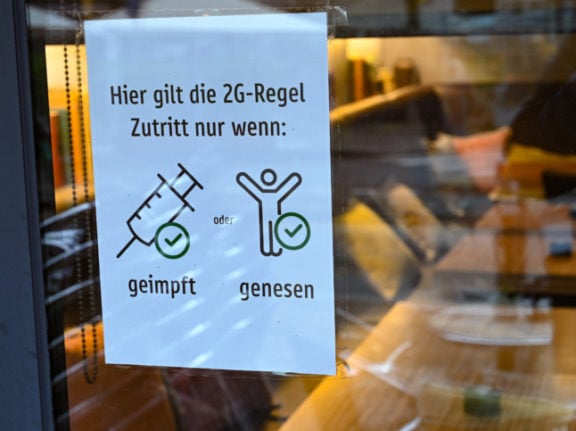State leaders and the government say that 2G rules will have to be brought in when the hospitalisation rate reaches a certain threshold.
When that happens, access to many public places would only be granted to people who are vaccinated against Covid (geimpft) or have recovered from Covid in the last six months (genesen). Unvaccinated people would be barred from entry.
Lots of states, including Berlin, Bavaria and Hamburg have already brought in the 2G rule.
READ ALSO: Everything you need to know about Berlin’s latest Covid rules
According to the states and government, only vaccinated or recovered people will be allowed to access leisure, cultural and sporting events, hospitality venues as well as to body-related services and hotels when the Covid situation in hospitals gets worse.
The measures are to take effect – if they have not already done so – when the hospitalisation rate for an area rises above the benchmark value of three. This figure describes the number of Covid-19 patients admitted to hospitals per 100,000 population over a seven-day period.
“We need to quickly put a brake on the exponential rise” in cases and intensive care bed occupancy, Chancellor Angela Merkel said after the meeting with state leaders.
Currently, all of Germany’s 16 states except Hamburg, Lower Saxony, Schleswig-Holstein and Saarland have a rate above three.
The regional leaders also want the 2G rule applied to Bundesliga footballers, reported AFP.
2G plus
If the hospitalisation rate reaches six, the so-called 2G plus rule will apply.
In places with a particularly high risk of infection – such as clubs or bars – people who have been vaccinated and those who have recovered will also then have to show a recent negative Covid test, according to the draft paper agreed by the state ministers and government.
From a hospitalisation incidence of nine, further measures such as contact restrictions are to be implemented.
The 2G rules can be waived if the hospitalisation number drops again over a certain period of time.
Checks will have to be “consistently and even more intensively monitored than before”, said the government and state leaders.
Exceptions to the 2G rule would be possible for children under 18.
As The Local reported, the government and states had drafted this rule earlier – but they were yet to thrash out how and when 2G would be brought in.



 Please whitelist us to continue reading.
Please whitelist us to continue reading.
What are the rules in obtaining the 2G+ negative test? If I have an event at 15:00, can I test the night before under the principle it is valid for 24 hours?